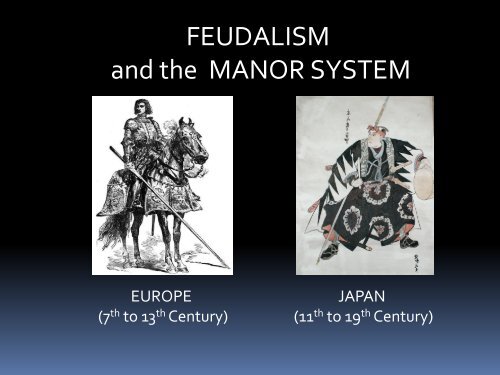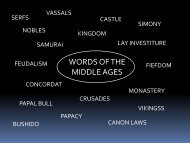You also want an ePaper? Increase the reach of your titles
YUMPU automatically turns print PDFs into web optimized ePapers that Google loves.
<strong>FEUDALISM</strong><br />
<strong>and</strong> <strong>the</strong> <strong>MANOR</strong> <strong>SYSTEM</strong><br />
EUROPE<br />
(7 th to 13 th Century)<br />
JAPAN<br />
(11 th to 19 th Century)
ORIGINS OF FEUDAL <strong>SYSTEM</strong> in EUROPE<br />
Changes in Government<br />
• Loss of Central Authority<br />
• Distrust in Roman Aristocracy<br />
• Increased Loyalty to Tribal Leaders<br />
FALL OF ROME<br />
Decline of Cities<br />
• Destroyed by Invaders<br />
• Disruption of Trade<br />
• Migration of People<br />
Private Jurisdictions Develop<br />
• Decay of Roman Authority<br />
• Germans claim conquered l<strong>and</strong>s<br />
• Local Fiefs established
ORIGINS OF FEUDAL <strong>SYSTEM</strong> in EUROPE<br />
RISE of NEW KINGDOMS<br />
Feudal Relationships Grow<br />
• Tribal Leaders grant l<strong>and</strong>s to Loyal Warriors<br />
Charles <strong>the</strong> Simple Of France<br />
Granted L<strong>and</strong>s in Norm<strong>and</strong>y<br />
to King Rollo of <strong>the</strong> Vikings<br />
• Neighboring Lords create Marriage Alliances<br />
• L<strong>and</strong> Dowries are granted to Daughter’s husb<strong>and</strong><br />
Yaroslav <strong>the</strong> Wise of <strong>the</strong> Rus married off his daughters<br />
Elizabeth of Kiev to King Harald III of Norway<br />
Anastasia of Kiev to King Andrew I of Hungary<br />
Anne of Kiev to King Henry I of France<br />
Agatha of Kiev to Edward <strong>the</strong> Exile of Engl<strong>and</strong>
ORIGINS OF FEUDAL <strong>SYSTEM</strong> in EUROPE<br />
New Invaders Threaten Europe<br />
• Norsemen (Vikings) from <strong>the</strong> North<br />
• Saracens & Moors (Muslims) from <strong>the</strong> South & East<br />
• Magyars <strong>and</strong> Tartars from <strong>the</strong> East
ORIGINS OF FEUDAL<br />
<strong>SYSTEM</strong> IN JAPAN<br />
RESULTS OF THE<br />
TAIKA REFORMS<br />
OUTSIDE THREATS<br />
• Mongols attempt to Invade<br />
• Warrior class created Military Society<br />
• Samurai gained control of Government<br />
• Nobles earned trust<br />
of <strong>the</strong> Emperor<br />
• Emperors granted<br />
Shoens (Tax Free<br />
l<strong>and</strong>s) to Loyal Nobles<br />
• Noble Daughters<br />
married crown princes<br />
• Loyal Nobles<br />
received high ranking<br />
government positions
FEUDAL SOCIETY IN MEDIEVAL EUROPE<br />
System of L<strong>and</strong><br />
Tenure based<br />
on <strong>the</strong><br />
Foundations of:<br />
• L<strong>and</strong><br />
• Loyalty<br />
• Service<br />
• Kings <strong>and</strong> Royalty (Political Authority)<br />
• Barons <strong>and</strong> Bishops (L<strong>and</strong> Managers)<br />
• Knights <strong>and</strong> Nobles (Feudal Defenders)<br />
• Artisans <strong>and</strong> Merchants (Economists)<br />
• Villains <strong>and</strong> Serfs (Food Producers)
FEUDAL SOCIETY IN<br />
JAPAN<br />
System of L<strong>and</strong> Tenure based<br />
on <strong>the</strong> Foundations of:<br />
• L<strong>and</strong><br />
• Loyalty<br />
• Service<br />
• Emperor (Divine Authority)<br />
• Shogun (Military Authority)<br />
• Daimyos (L<strong>and</strong> Managers)<br />
• Samurai (Feudal Defenders)<br />
• Peasants (Food Producers)<br />
• Artisans <strong>and</strong> Merchants
FEUDAL OBLIGATIONS IN BOTH SOCIETIES<br />
• SURETIES<br />
Legal liabilities, debts or duties owed to a<br />
Feudal Lord or Kings (expressed or implied)<br />
• AIDS <strong>and</strong> MIZES<br />
A tangible subsidy (means of assistance)<br />
provided to a King or Lord to assist in <strong>the</strong><br />
maintenance of <strong>the</strong> feudal fief or manor<br />
• COMMENDATION OF LANDS<br />
Rulers (Kings or Emperors) entrust <strong>the</strong> care<br />
<strong>and</strong> preservation of l<strong>and</strong>s to loyal lords<br />
• OATHS OF FEALTY<br />
Feudal Lords required vassals to take Oaths<br />
of Fealty to be faithful in <strong>the</strong>ir obligations of<br />
serve to <strong>the</strong>ir lord & preservation of <strong>the</strong> realm
FEUDAL ESTATE<br />
(FIEF or SHOEN)<br />
Self-Sufficient Economic<br />
Foundation of <strong>the</strong> Feudal<br />
System<br />
• CASTLE or DONJON = Central Fortification <strong>and</strong> Home of <strong>the</strong> Noble Lord<br />
• <strong>MANOR</strong> VILLAGE = Economic Center of <strong>the</strong> Feudal Fief or Shoen<br />
• CHURCH or TEMPLE = Spiritual Center of <strong>the</strong> Feudal Manor or Shoen<br />
• WORKSHOPS <strong>and</strong> MILL = Producers of Crafts <strong>and</strong> Processed Goods<br />
• FIELDS <strong>and</strong> PASTURES = Primary Producers of Food for <strong>the</strong> Manor or Shoen
STANDARD STRUCTURE of <strong>the</strong> CASTLE (DONJON)<br />
• Moat (Usually not filled with water)<br />
• Bridge or Drawbridge<br />
• Gatehouse or Barbican (GuardHouse)<br />
• Outer Bailey (Outer Ward or Compound)<br />
• Inner Bailey (Inner Ward or Compund)<br />
• Castle Keep or Donjon (Nobles Residence)<br />
FEUDAL CASTLE<br />
or DONJON<br />
Primary Defensive System<br />
of <strong>the</strong> Manor or Shoen
CASTLES OF<br />
MEDIEVAL<br />
EUROPE
JAPANESE<br />
FEUDAL<br />
CASTLES<br />
(DONJON)
EUROPE’S FEUDAL DEFENDERS<br />
ARCHERS<br />
• Middle Class<br />
• Medieval Artillery<br />
FOOT SOLDIERS<br />
• Lower Class<br />
• Medieval Infantry<br />
KNIGHTS<br />
• Nobles by Birth<br />
• Usually <strong>the</strong> 2 nd Son<br />
• Heavy Cavalry<br />
• Code of Chivalry
SAMURAI<br />
• Noble By Birth<br />
• All sons trained in <strong>the</strong> ways of <strong>the</strong><br />
Warrior<br />
• “Bushido” as <strong>the</strong> Code of Honor<br />
• Service based on honor & loyalty<br />
RONIN<br />
• Samurai who are<br />
without a Lord <strong>and</strong><br />
Master<br />
• Usually serve as<br />
Archers or Foot<br />
Soldiers<br />
• Professional soldiers<br />
paid for services
WARRIOR’S CODE<br />
CHIVALRY<br />
Knightly Virtues<br />
<strong>and</strong> Service to<br />
O<strong>the</strong>rs<br />
BUSHIDO<br />
Selfless Service<br />
through <strong>the</strong><br />
“Way of <strong>the</strong> Warrior”<br />
The Chivalric Virtues The Virtues of Bushido<br />
• Prowess (Excellence in all endeavors)<br />
• Justice (Seek <strong>the</strong> path of righteousness)<br />
• Loyalty (Unwavering commitment)<br />
• Defense (Protect All regardless of status)<br />
• Courage (Brave <strong>and</strong> Truthful in all things)<br />
• Faith (Steadfast in his beliefs <strong>and</strong> God)<br />
• Humility (Modest <strong>and</strong> gentle spoken)<br />
• Largesse (Charitable <strong>and</strong> generous to all)<br />
• Nobility (Holding to all <strong>the</strong> knight’s virtues)<br />
• Franchise (Selfless service without reward)<br />
• Gi – Righteous Justice<br />
• Yu – Courage (Bravery)<br />
• Jin – Benevolence (Charity)<br />
• Rei – Respect (Dignity)<br />
• Makoto - Honesty (Fidelity)<br />
• Meiyo - Honor (Integrity)<br />
• Chugi – Loyalty (Devotion)
















